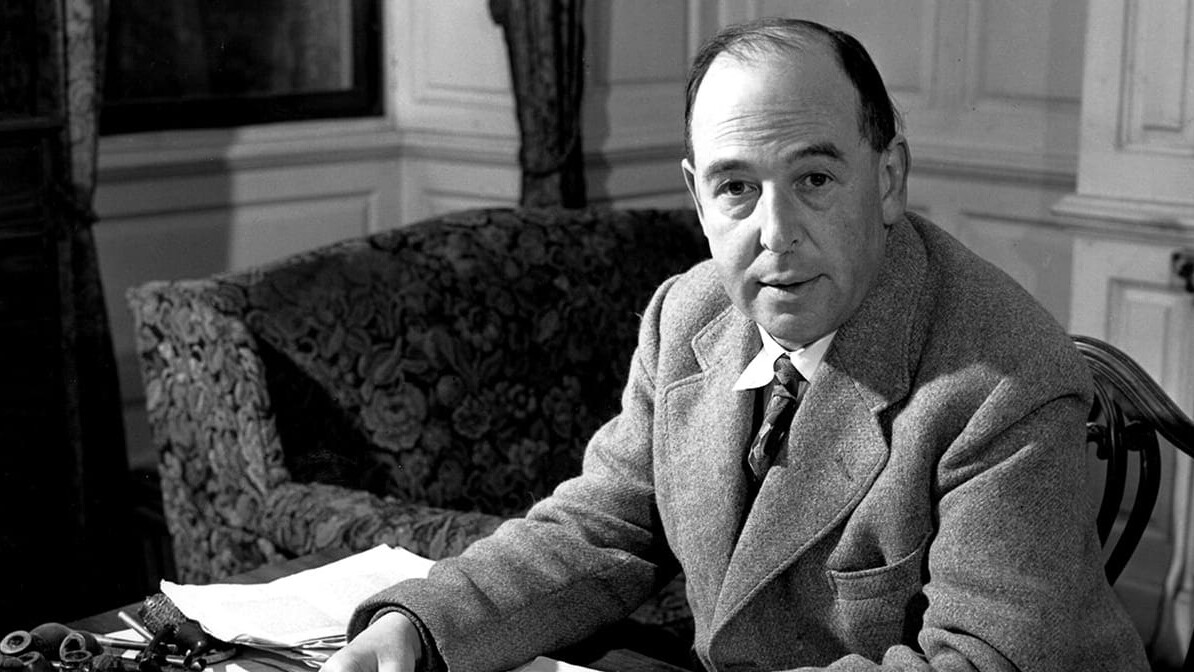- Home
- Entertainment
- Max McLean, C. S. Lewis, and The Most Reluctant Convert

Max McLean, C. S. Lewis, and The Most Reluctant Convert
John Farrell: What is it about C. S. Lewis that makes him so interesting to you?
Max McLean: I think his conversion is really interesting because it came as a result of the influence of his friends, his experience, and a lot of rational thought of serious study of scripture that came before his conversion.
He said his argument against God was that the universe was so cruel and unjust, but his friend started asking him to look at his assumptions. Where did he get this notion of cruel and unjust? If you call a line crooked it’s because you have some idea of a straight line, so what are you comparing this universe with when you call it “cruel and unjust”? You must be comparing it to a universe that is caring and loving and full of justice. If the universe has no meaning, no one would ever know it has no meaning. Meaning wouldn’t exist.
That was the first step for him to take the Bible seriously. His first step was a belief in the God of the Bible. He was almost like Moses at the burning bush when he was confronted with the Great I Am. Then slowly, through the help of his friends, he recognized the significance of Jesus as the incarnation of the Great I Am, who in Lewis’s mind, the grand miracle was God humbled himself, made himself so small that he could enter into our created universe of time, matter, and space to become one of us in order to pull us out and to be with Him.
JF: What is the overall message you hope viewers take from the movie The Most Reluctant Convert?
Max: I think the main message is they will see somebody who resisted Christianity so strongly and finally give into it and consider it undeniably true. Once he was convinced that it was true, he submitted himself wholeheartedly to it.
From Stage to Screen
JF: The Most Reluctant Convert started out as a play. How did the film come out of that stage production? What was it like turning the stage adaptation into a film?
Max: It started as a play because my training is in the theater, not so much film. There are two very distinct techniques for filmmaking and theater making, let alone acting for the camera and acting on stage.
The film was a result of the pandemic in the sense that we’re a theater company based in New York. We had three shows touring around the country. One was playing in New York. When the pandemic came, everything shut down. You remember, like I do, “15 days to flatten the curve.” I kept thinking, “Well, what am I going to do for the next two weeks?” Well, two weeks became 17 months when we were shut down.
In those 17 months, we got together as a team. We were working with Norman Stone, a great Scottish film director. He called me because we’d been talking about making this play into a movie, but we saw this as several years down the road. But when the pandemic came, and we had no work, he said British Theater making is going to open up in August of 2020. He told me this in June, and if we could move quickly, he could get a really good crew and cast because nobody had worked since March. I asked him to confirm all that and make sure the locations we needed were available, and then I flew over there, quarantined for a couple of weeks. Started shooting in September, finished shooting in October.
We took this one-person play that’s very linear, chronological, and opened it up to 15 actors, 190 extras, 270 costumes on 18 different locations in and around Oxford. Focus on the Family’s movie magazine, Plugged In, called it the “Best Christian Movie of the Year.”
JF: Could you tell me about your history with stage theater?
Max: I studied theater in college. I went to graduate school in London and came back to New York and have been acting professionally for about 40 years, creating mostly my own productions. Then I started a production company, Fellowship for Performing Arts, and we produce in New York and tour nationally.
I think our shows have been seen by hundreds of thousands, if not millions of people. What we’re new to is film. Film is a new arena for us and that started with the film version of The Most Reluctant Convert, but we just signed an agreement to do two new films.
JF: Going back to the conversion of “The Most Reluctant Convert” from stage to the big screen, what was it like seeing that project grow to where more and more people were going to be able to see it on the big screen?
Max: The play started in New York. It ran for 15 weeks, and then it toured. We had well over a hundred thousand people see it on tour. We did a lot of colleges and universities like UC Berkeley, Duke, UNC Chapel Hill, University of Virginia, Michigan, Florida, Columbia. So, it had quite a following.
Over a three- to four-year period, we had about a hundred thousand people see it. We had a hundred thousand people see it the first night we opened on November 3, 2021. That just shows you the power of media. The digital world is so ubiquitous that more people could see a movie in one day than saw it in over a three- to four-year period.
On the day we opened, we were the number two film in America in terms of box office. More than Bond. We were second to Dune and this was because Dune was in 3,000 theaters. We were only in about 600, but our per-screen average was the highest of anyone in the country.
JF: Obviously, some elements of the C.S. Lewis story lend themselves better to the stage production than the big screen and vice versa. How is the stage production of the story and the film version of it different from one another?
Max: The script is very close. The imprint of theater is the voice. That’s what the audience really holds into and everything else is secondary to that. Whereas the imprint of film is the image. So, what you have to do is take the stage play and, for lack of a better visual phrase, blow it up so that you go from one actor to one scene, to 15 actors in 18 different locations all over Oxford, including 190 extras, and 270 costumes. That really opens it up.
I think the big distinction is in theater you really give a little bit more room for the imagination, whereas in film, much of the imaginative work is done by the filmmaker and presented for viewing to the audience.
Lewis and His Importance
JF: You’ve also done another play, “C.S. Lewis on Stage: Further Up & Further In.” Could you please tell me about it?
Max: The first play covers Lewis’s early life from roughly 1908, when his mother died of cancer at the age of 9, ending when he takes communion for the first time at Christmas 1931 at the age of 32 years old as a fully believing, committed follower of Christ. But a lot of people come to faith and they don’t become C.S. Lewis, right? So, what was it that prompted this conversion? How did the Lord use this conversion to platform this man so that he would become the most influential Christian writer of the 20th century? He got a national audience with the BBC to explain Christianity to people who didn’t really understand it. Since his conversion, he’s published like 30 books that have sold almost a quarter of a billion copies, which is really extraordinary.
JF: Why is the work of C.S. Lewis, and himself in particular, so relevant in today’s society? What is so special about him and his work that still resonates with a large number of people today?
Max: I would say that he really understands what an unbeliever is thinking with regard to things of faith and things of Christ, so he addresses those points in a very clear, profound, imaginative way that provides a level of clarity that’s found almost nowhere else. He was a scholar of great renown in the field of Renaissance and Medieval literature. In that world, he read everything from the Greeks to the moderns. He had a steel trap mind that could remember everything he wrote, and he could interpret it, and translate it into magnificent prose and speech that would capture millions, if not hundreds of millions, people’s imagination about the things of Christ. He did all of that under the headship of Jesus Christ because he was so fully committed to the Lordship of Christ and wanted to make Him known.
Lewis and Tolkien
JF: It’s well known that he had a friendship with J.R.R. Tolkien. Could you talk about that and how his relationship with another great writer of that time period impacted his writing?
Max: Lewis credits Tolkien with his Christian conversion. I mentioned earlier that his first conversion was to the God of Abraham, Isaac, and Jacob. He says somewhere that his religion was like that of the Jews, but he was very committed. He understood that God was sovereign and that he needed to obey a sovereign God, but he didn’t really recognize the significance of Jesus Christ.
Tolkien was the one that really made it clear to him of the uniqueness of Jesus and why one should become a Christian. So, Lewis credits Tolkien for explaining the significance of Jesus and what it did was made him read the Bible anew. Read the gospels anew.
He recognized that nobody is as significant as this Jesus. He came to the conclusion that if what the scriptures say about him are not true, then this guy’s a raving lunatic because he makes outrageous claims. So, he came to that famous conclusion that either Jesus was a liar, a lunatic, or a Lord, but you can’t just say that he was a great moral teacher because no great moral teacher would say the sort of things he said. He said that option is not available to us, nor was it intended to be, and he ended up by saying, “If Jesus’ statements are false, Christianity is of no importance. If true, it’s of infinite importance. But one thing it cannot be is moderately important.”
JF: What’s your personal favorite work of Lewis and why?
Max: The book that really turned me on to Lewis was The Screwtape Letters and the reason for it is it really revealed spiritual warfare in its depths. It made me aware of how the devil works in a way that I wouldn’t have understood otherwise. I’m really appreciative to Lewis for that.
JF: Where can people find out more information about your movie and play?
Max: They can go to our website, cslewismovie.com, and find out just about anything with regard to our movie and our plays.
…
Featured Image Credit: Aronsyne / C.S. Lewis in Studio / CC BY-SA 4.0 Deed
Trending Now
Sign up today for your Inspiration Today Daily Newsletter
Supercharge your faith and ignite your spirit. Find hope in God’s word. Receive your Inspiration Today newsletter now!
John Farrell
John Farrell serves as the Digital Content Manager at Inspiration Ministries, where he oversees the planning, organization, and management of website content to support the ministry's global digital outreach. With a strong background in writing and editorial strategy, John ensures that the articles, devotionals, and discipleship resources on Inspiration.org are accurate, engaging, and aligned with the ministry's mission.
John has authored more than 1,000 articles, press releases, and features for Inspiration Ministries, NASCAR, Lionel, and Speed Digital. His versatility as a writer is also showcased in his 2012 book, The Official NASCAR Trivia Book: With 1,001 Facts and Questions to Test Your Racing Knowledge.
A graduate of Appalachian State University, John brings excellence and attention to detail to the digital experience at Inspiration Ministries. He lives in Concord, N.C., with his wife and two sons.
Related Articles
March 10, 2025
Finding Total Victory on the Road to Championship
I have been playing competitive golf for 55 years. Through the various stages of my life, my…
March 7, 2025
Average Joe Movie: SCOTUS, Praying Football Coach Backstory
When Coach Joe Kennedy knelt to pray at the 50-yard line after a high school football game, he had…
February 28, 2025
The Power of Story: A Muslim Journey to Hope
Storytelling is one of the oldest and most powerful ways to touch the human heart. Parents tell…
February 27, 2025
‘Harriet’ Movie: Courage, Freedom, Faith
Antebellum abolitionist Harriet Tubman had convictions and courage that helped free herself…
Next Steps To Strengthen Your Walk
Inspiration Today Newsletter
Supercharge your faith and ignite your spirit. Find hope in God’s word. Receive your Inspiration Today newsletter now!
Christian Articles
Find articles to strengthen your walk and grow your faith. We have a wide range of topics and authors for you.
Submit A Prayer Request
We are here for you. Simply click on the button below to reach us by form, email or phone. Together we will lift our hearts and voices with you in prayer.





